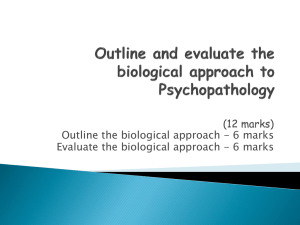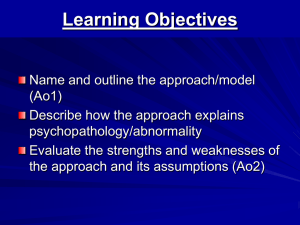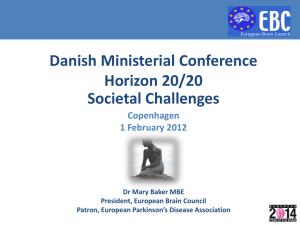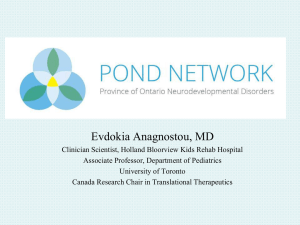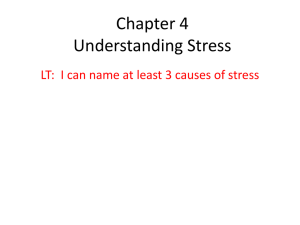lesson 4 Presentation slides
advertisement
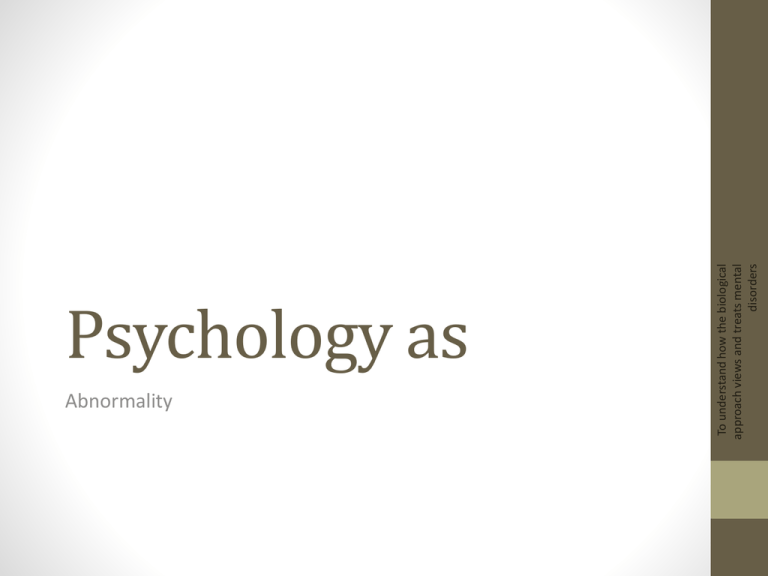
Abnormality To understand how the biological approach views and treats mental disorders Psychology as Lesson objective To understand how the biological approach views and treats mental disorders • To express an overview of what the biological module and evaluate the different factors of the approach. 4 Principles B.I.N.G • Infection (Virul) infections such as Syphilis can cause mental disorder type symptoms. • Neurotransmitters - too much or too little of a neurotransmitter might produce disorders –> high levels of dopamine ( control movement, emotional response, and ability to experience pleasure and pain) are linked to schizophrenia. • Genetics Faulty genes might cause some diseases that have psychological effects e.g. Huntington’s disease leads to a wearing away of mental abilities (Twin studies) To understand how the biological approach views and treats mental disorders The cause of them may be: • Brain injury (hitting the head might cause psychological disorders – people who knock their heads might become ‘different people’ afterwards) eg Phinius gage! How does the biological perspective research? Adoption studies. Heston (1966) did an adoption study – 47 adopted children whose mothers had schizophrenia, and 50 adopted children whose mothers didn’t have schizophrenia – 5 of the experimental group got schizophrenia (another 4 borderline) and 0 of the control group To understand how the biological approach views and treats mental disorders Twin studies and Schizophrenia Gottesman (1991) – meta-analysis of about 40 twin studies – found concordance rate for schizophrenia of 48% in monozygotic twins and 17% in dizygotic twins Virus Infection • Some disorders may be explained by exposure to viruses in the womb. Research has found that mothers of some schizophrenics have contracted a strain of the flu virus during pregnancy. • The virus is thought to enter the unborn child's brain remaining dormant until puberty. To understand how the biological approach views and treats mental disordersTo understand how the biological approach views and treats Psychological disorders are physical illnesses... Neuroantatomy and neurochemistry - Abnormalities in the structure of the brain may determine abnormality. Eg; enlarged spaces in the brain, including shrinkage if the brain tissue around the ventricles. - Altered brain chemistry can lead to abnormal behaviour. Eg; low serotonin have been found in the brains of individuals suffering depression - http://www.youtube.com/watch?v=v0v2LgZOlhw - http://www.youtube.com/watch?v=cNaFnRKwpFk&feature=re lated Strengths of biological approach • Techniques have shown that there are biological components • When it explains things, it is scientific and theres lots of facts to support it! To understand how the biological approach views and treats mental disorders • Research shows that there can be a genetic link, therefore Drugs can work as treatment options. Weaknesses of biological approach • Humane/ inhumane • The emergence of a biological approach to abnormality meant that mental illness could be treated however, Szasz suggested that the concept of ‘mental illness’ was invented merely to control (through drugs of hospitalisation) those individuals who society could not accept as they are. • Szasz argued that unlike physical illness, most mental disorders did not always have a psychical basis and therefore could not be treated in the same way. • Eg; Syphilis/Anorexia – virus -> disease of the mind • Epilepsy – brain disease • In twin studies of Schizophenia the concordance is only about 50%, suggesting that environmental influences are equally important. Nature and nurture debate!!! • Its is possible that what is inherited is a vulnerability to the disorder. Which only develops under certain stressful conditions. (diathesis-stress model) To understand how the biological approach views and treats mental disordersTo understand how the biological approach views and treats Inconclusive evidence • If mental disorders are caused by genetic factors alone, the concordance rates would be 100% for that mental disorder. • Cause and Effect • There isn’t a simple cause and effect relationship between biological influences and mental disorders. Research has shown that some schizophrenics have enlarged ventricles. • Buts its not clear whether these are the cause of schizophrenic symptoms or a consequence of them. (e.g taking medication to treat schizophrenia)
